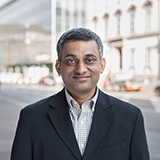We must ensure a digital future that is safe and inclusive for all, say Flavia Bustreo, Siddhartha Jha, and Stefan Germann
Digital concepts and solutions that were considered science fiction only a few decades ago are now coming to fruition. Remarkable developments in areas such as nanotechnology, connectivity, and artificial intelligence (AI) are unprecedented in scope, velocity, and impact, allowing for endless possibilities as well as disruptions. This is our fourth industrial revolution, and its disruptive potential for healthcare is only beginning to be grappled with. [1]
With each opportunity, the fourth industrial revolution also brings critical questions such as, who owns our data? What bias is within these data? Who has access to the data? And how will the data be regulated? These are key matters that need to be tackled before global health governance and equity can be secured.
Digital disruptions have changed the nature of healthcare delivery. AI innovations have increased the speed at which clinical researchers can generate potential molecular targets for accelerated drug development, and with help from AI we can monitor individual health with exceptional accuracy. Further yet, the use of AI applications could result in enormous saved healthcare costs, whereby we move from reactive disease management to proactive prevention and health promotion, thus disrupting the entire healthcare sector. [2]
We have many reasons to be optimistic that AI could prove transformative for healthcare, including in resource poor settings. [3] But the extent to which everyone will benefit remains to be seen. The data that feed into AI systems deserve critical attention. To ensure value for all human beings—irrespective of race, ethnicity, region, gender, or age—we need unbiased and fully representative data. Without inclusivity and accessibility, the exponential developments of the fourth industrial revolution will only increase the gap between those who can benefit and those left behind. We need to foster environments suitable for AI and data governance frameworks across the world and to proactively engage governments, communities, and public and private players in discussions at every level, to generate unbiased, accurate, and secure data.
The technological drivers of AI, big data, and digital solutions have major implications for global and national health governance and policy making. The speed at which these innovations develop requires us to change the nature of traditional, analogue management mindsets. Current approaches to ethical, legal, and regulatory frameworks are not sufficient to regulate new forms of data or the speed at which this change is happening.
As Daniel Zajfman, president of the Weizmann Institute, said: “It seems that for the first time in human evolution, the speed of change is outpacing our evolutionary brain capacity to cope with it.” [4] Evidence tells us that the rapid growth in health data is facilitating an unprecedented understanding of our health and wellbeing like no other in human history. In Nigeria, for example, satellite and mobile phone data enabled the identification of 80 000 people showing high risk of malaria transmission. [5]
Unfortunately, current trends show a move towards the privatisation of health data by the global tech giants and insurance companies. With this is mind, the data that work to combat diseases could be harnessed as another commodity shared with only the highest bidders. Initiatives such as the Open Data Barometer show a readiness by some governments to adopt more transparent data frameworks, but all actors in global health governance must make a collaborative effort for all health data to become a global public good. [6]
We should look to the Indian government’s recent introduction of the World Health Assembly resolution on digital health as a starting point towards the creation of health data as a global public good. [7] But this still needs to be heavily built upon. Privacy, confidentiality, access, ethics, and ownership issues must be efficiently tackled, and the recently launched UN secretary general’s high level panel on digital cooperation should take the governance and management of health data into consideration if it is to ensure a digital future that is safe and inclusive for all. [8] At the same time, we should develop and harness innovative solutions to unlock the value of this data to advance global health and wellbeing. Only then can we ensure that the fourth industrial revolution will live up to its promise in terms of our future health.
 Flavia Bustreo is an international expert and advocate for child health and wellbeing and was previously the assistant director general for family, women’s and children’s health for the World Health Organization. She is currently a member of the board of Fondation Botnar.
Flavia Bustreo is an international expert and advocate for child health and wellbeing and was previously the assistant director general for family, women’s and children’s health for the World Health Organization. She is currently a member of the board of Fondation Botnar.
 Siddhartha Jha is the artificial intelligence/digital programme manager for Fondation Botnar.
Siddhartha Jha is the artificial intelligence/digital programme manager for Fondation Botnar.
 Stefan Germann is the CEO of Fondation Botnar
Stefan Germann is the CEO of Fondation Botnar
Competing interests: None declared.
References:
1 Schwab K. The fourth industrial revolution. New York: World Economic Forum; 2017.
2 Collier M, Fu R, Yin L. Artificial intelligence: healthcare’s new nervous system. Accenture, 2017.
3 Wahl B, Cossy-Gantner A, Germann S, Schwalbe NR. Artificial intelligence (AI) and global health: how can AI contribute to health in resource-poor settings? BMJ Glob Health 2018;3:e000798. PubMed doi:10.1136/bmjgh-2018-000798
4 Zajfman D. Curiosity driven research as driver for high value innovation. Presentation at 5th Agora round-up held in Zürich on 3 September 2018.
5 Global Partnership for Sustainable Development Data. Goal 3; good health and wellbeing. http://www.data4sdgs.org/sdg3
6 World Wide Web Foundation. International open data conference. webfoundation.org/2018/09/join-us-at-the-international-open-data-conference/
7 World Health Organization. Digital health. 21 May 2018. apps.who.int/gb/ebwha/pdf_files/WHA71/A71_ACONF1-en.pdf.
8 United Nations. Secretary general’s high level panel on digital cooperation. http://www.un.org/sg/en/content/sg/personnel-appointments/2018-07-12/secretary-generals-high-level-panel-digital-cooperation
